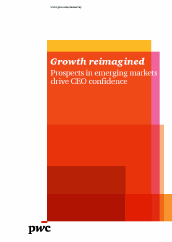15th Annual Global CEO Survey
Risk resilience
Local risks can be amplified into global ones
The speed with which risk events unfold – and the extent to which their impacts on the business spread across different risk categories – appear to be escalating. In the past 12 months alone, 56% of CEOs said their businesses were financially impacted by the sovereign debt crisis in Europe; 29% cited an impact from Japan's earthquake and tsunami; and 21% cited the political upheaval in the Middle East.
The strength of cross-border ties.
Three-quarters of CEOs in Western Europe are concerned about instability in capital markets and government responses to fiscal crises. Many in North America also believe rising public deficits are a threat although they’re the least concerned about rising taxes. Exchange rate volatility and unstable capital markets are potential constraints on expansion in both Asia-Pacific and CEE economies. Rising taxes and over-regulation loom large for CEOs in Latin America. And exchange rate volatility is high among the concerns of CEOs in the Middle East and Africa – as is the availability of key skills. In fact, talent shortage is a common concern across most regions.
Key Findings
|
Embracing volatility
Mounting uncertainties are pressuring CEOs’ confidence. But businesses are not entirely on the defensive. Trends that support long-term investments in key markets remain firmly in place. Half of CEOs based in developed markets believe that emerging economies are more important to their company’s future, as do 68% of CEOs who are themselves based in emerging markets. |
|
Local approaches to global growth
CEOs are committed to expanding local customer bases in their priority markets. But rather than simply exporting products, they're building diverse local operations, from services capabilities to manufacturing capacity. Critically, they're changing their product mix – and sometimes their entire operating models – to meet very local needs and conditions. |
|
Facing the talent challenge
Skills shortages are having a real impact on growth. One in four CEOs said they’ve had to cancel or delay a strategic initiative because of talent constraints. Rising compensation is one factor, but for more CEOs, there is simply a deficit of qualified candidates at a time when more CEOs expect to expand their workforces than to reduce. |
|
Innovating on multiple fronts
The innovation priority remains: Almost a third of CEOs believe that their biggest opportunities for growth lie in developing new products and services. CEOs in the communications, and media and entertainment sectors are the most active on all fronts, whether it means refocusing innovation efforts for existing products and services or for entirely new products in new models. |
Contacts
|
Sophie Lambin
Director, Global Thought Leadership PricewaterhouseCoopers International Tel: +44 (20) 7213 3160 |





